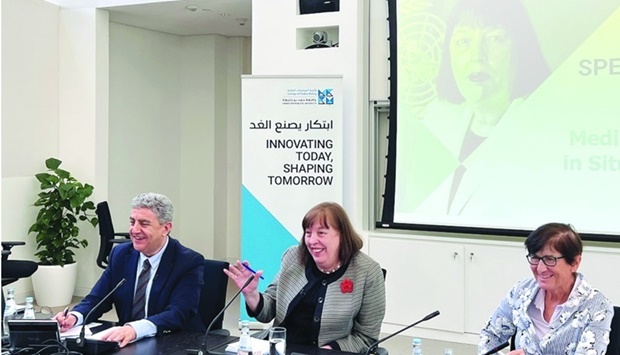Her talk emphasised the protection of conflict-affected children as a central pillar of human rights, peace and security, peacebuilding, development and humanitarian agendas.
Titled 'Mediation to Protect Children in Situations of Armed Conflict', the event was a collaboration between HBKU’s College of Public Policy (CPP) and College of Law. Dr Sultan Barakat, incoming CPP professor, moderated the interactive discussion, which included key Qatari, UN and international stakeholders, along with HBKU faculty, students and members of the wider Education City community.
Given the increasing vulnerabilities facing children in conflict zones, the Special Representative discussed the challenges linked to integrating and prioritising specific child protection mandates in peace processes, negotiations, and agreements. Offering a UN perspective, she considered the work being done by her office, as the leading UN advocate for the protection and wellbeing of children affected by armed conflict. Her work includes efforts to promote a broader exchange between the child protection and mediation communities.
The Special Representative noted the importance of including children’s rights and needs in mediation and peacebuilding efforts to ensure sustainable peace. She noted that children must remain at the heart of our efforts to build peaceful and prosperous societies.
After the event, Dr Barakat said: “We greatly appreciated having the UN Special Representative share her insights on the challenges of protecting children during armed conflicts. We were glad of the opportunity to discuss how HBKU can support her office’s mission and be part of fostering concerted, collective efforts through our educational and research initiatives. These include striving for conflict prevention and peaceful resolution.”
Susan Karamanian, dean of the College of Law, added: “Qatar is a signatory to the UN Convention on the Rights of the Child and other human rights treaties that establish a legal framework to protect children. Special Representative Gamba shared critical insights into the practical application of these rights in conflict and post-conflict situations. Her work dovetails with that of our college as we recognise that education and research in the areas of international humanitarian law and international human rights law can help end grave violations of children’s rights or at least try to remedy such violations.”
For more information on HBKU, a member of Qatar Foundation, visit www.hbku.edu.qa
Titled 'Mediation to Protect Children in Situations of Armed Conflict', the event was a collaboration between HBKU’s College of Public Policy (CPP) and College of Law. Dr Sultan Barakat, incoming CPP professor, moderated the interactive discussion, which included key Qatari, UN and international stakeholders, along with HBKU faculty, students and members of the wider Education City community.
Given the increasing vulnerabilities facing children in conflict zones, the Special Representative discussed the challenges linked to integrating and prioritising specific child protection mandates in peace processes, negotiations, and agreements. Offering a UN perspective, she considered the work being done by her office, as the leading UN advocate for the protection and wellbeing of children affected by armed conflict. Her work includes efforts to promote a broader exchange between the child protection and mediation communities.
The Special Representative noted the importance of including children’s rights and needs in mediation and peacebuilding efforts to ensure sustainable peace. She noted that children must remain at the heart of our efforts to build peaceful and prosperous societies.
After the event, Dr Barakat said: “We greatly appreciated having the UN Special Representative share her insights on the challenges of protecting children during armed conflicts. We were glad of the opportunity to discuss how HBKU can support her office’s mission and be part of fostering concerted, collective efforts through our educational and research initiatives. These include striving for conflict prevention and peaceful resolution.”
Susan Karamanian, dean of the College of Law, added: “Qatar is a signatory to the UN Convention on the Rights of the Child and other human rights treaties that establish a legal framework to protect children. Special Representative Gamba shared critical insights into the practical application of these rights in conflict and post-conflict situations. Her work dovetails with that of our college as we recognise that education and research in the areas of international humanitarian law and international human rights law can help end grave violations of children’s rights or at least try to remedy such violations.”
For more information on HBKU, a member of Qatar Foundation, visit www.hbku.edu.qa

